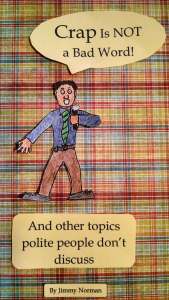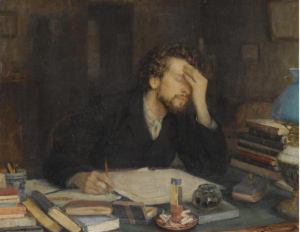5 Confusing Quotes about Writing from Famous Authors
If anybody can create a decent quote or give advice to aspiring writers, it’s a famous author. I like reading quotes about writing from famous authors. Some of the quotes from famous authors offer great advice, and others are witty. But every once in a while, I see a quote about writing that doesn’t seem quite… correct. Sometimes these quotes confuse me.
I don’t mean to be disrespectful by calling these quotes confusing. Maybe I’m the confused one. Maybe I don’t know the context of each quote. Maybe the quotes themselves are incorrect or misattributed. Maybe I don’t know anything and should stick to watching football. At any rate, I’ve seen each of these quotes several times, and I usually say to myself after each one, “That’s kind of confusing.”
5 CONFUSING QUOTES ABOUT WRITING FROM FAMOUS AUTHORS
“The scariest moment is always just before you start.” Stephen King
Yeah, it’s funny (or ironic) that Stephen King thinks writing is scary, but I like the moment before I start. In fact, I usually enjoy most of the writing process (except getting interrupted. Then I turn into a jerk). The only thing scary about writing is the idea of reading in front of a bunch of people. I might get angry or frustrated or depressed when I write (or before or after I write), but fear is not an emotion that I feel when I write or when others read my writing. And that’s strange because I’m scared of a lot of things, but I’m not scared of writing.
*****
“Write what you know.”- Mark Twain
I almost didn’t use this one because there’s disagreement about whether or not Mark Twain should get credit for this quote. I have no opinion about that. I only use this quote because a couple English teachers used to say this a lot. Mark Twain wrote a lot about what he knew (like life on the Mississippi River and exploring caves in Hannibal), but he used a lot of imagination too.
I like writing about things that I don’t know because people who actually DO know then respond and tell me where I’m wrong and I learn something without having to do research. I’d rather be told that I’m wrong and learn from that than do research. I like it when other people do my work for me. This shows that writing about what you don’t know can pay off.
Since this one might not be a Mark Twain quote, I chose another Twain quote as back up.
*****
“Writing is easy. All you have to do is cross out the wrong words.” Mark Twain
I’m not sure it’s as easy as Mark Twain suggests. First, you have to write all the words. And then you have to know which ones are the wrong words. And then you have to have enough words that aren’t wrong words to have something that makes sense. That makes writing not easy.
*****
“There is nothing to writing. All you do is sit down at a typewriter and bleed.”- Ernest Hemingway
I understand why writers appreciate this quote, but, really, everybody with a passion bleeds (metaphorically). Artists bleed. Singers, dancers, actors all bleed. Athletes bleed. A lot of people (like military and police officers) literally bleed and sacrifice. At least writers get to sit down and bleed. But since sitting down is so unhealthy for us and causes so many long-term health issues, maybe our bleeding really is worse than everybody else’s bleeding.
I don’t like bleeding, literally or metaphorically, but I like writing.
*****
“There’s no such thing as writer’s block. That was invented by people in California who couldn’t write.”– Terry Pratchett
I don’t know. I think writer’s block was invented before California was invented. Maybe California was invented by people with writer’s block. I don’t mean that as an insult. I like California.
*****
“All the information you need can be given in dialogue.”- Elmore Leonard
That may be true, but I don’t like people (or characters) who talk too much.
*****
“The adjective is the enemy of the noun.”– Francois Marie Arouet de Voltaire
Usually authors gripe about the adverb, but here we have a writer denouncing the adjective. Exclamation points get criticized by a lot of writers too. Personally, I believe in using all kinds of words and punctuation wherever possible. I believe in word diversity. What’s the point of having a part of speech and then not use it? If I ever become famous, I might denounce pronouns just to see if other authors stop using pronouns as well.
Actually, I would never stop using pronouns. I would just denounce them for the sake of denouncing a part of speech, and then I would continue using them. And I believe in using adverbs very often as well.
*****
Writing should be difficult and frustrating, but maybe it shouldn’t be confusing. That’s why I don’t like getting confused when I read quotes about writing from famous authors. If I get confused when great authors write about writing, then that might mean I’ll never become a successful writer because successful writers should never get confused about what good writing is.
Are there any quotes about writing that you think are confusing? Which of these quotes do you agree with (or disagree with) the most? Which of these quotes confuses you the most (or least)? Can a writer become successful if he or she gets confused by quotes about writing from famous authors?
*****
When I was a kid, I got my mouth washed out with soap for saying the word “crap.”
Looking back, it ticks me off because now I know that…
Now available on Amazon!




I think the quotes are useful to us because they are confusing. They make us think about what they say to us. Sometimes thinking is a good thing. 🙂
This was a great post. I would agree with cat9984 pondering confusing quotes can be helpful – it can also just cause more confusion.
For me, the scariest moment is right before I hit Submit to send a story to a magazine or agent. I take some exception to the Pratchett quote, since it seems like he’s saying that if you ever have trouble getting an idea, then you’re just making excuses and can’t really write. Although maybe that’s exactly what he thinks.
The comments of those who come before and have excelled can be used as signposts even if we don’t follow them…still interesting to note the mentality of the writers at the time. Write to satisfy the need within you. Sorry, didn’t mean to be “quoty”. 🙂
I like the Earnest Hemingway one. That’s deep! Not sure that athletes bleeding could be compared in the same way. Maybe song writers though.
I actually agree with ‘Write What You Know’. I don’t think it necessarily suggests that you can’t research something like a time or a place. I do think that it’s difficult to write about how your character should think or feel unless you have some sort of experience (either first-hand or otherwise) with their struggle. Good post 🙂
“Don’t wait for miracles. Your whole life is a miracle. Live it up and dare to leave an impact. There is no rehearsal.”
thank you
I just discovered your blog. Me gusta. Mucho. I’m always left wondering if Mark Twain really meant what he was writing, or if it was all just a big joke to him. Sure makes for some fun quote-tiquing.
As far as the article you mentioned you are going to write (or maybe already have) on rules that writers break, here is my favorite: Use words that make sense to other people. I prefer to noodle around neologisms of my own design challenging people to make sense of them. Usually, I give them enough help. But, when the wheezing frinter winds frow, I just go with it.
Thanks,
M.M.
When I get famous, I’m going to denounce “the.” Muahaha.
Reblogged this on WILDsound Writing and Film Festival Review.